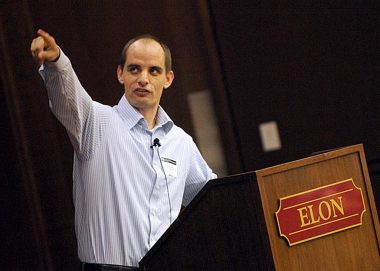The rise of online social networks, coupled with the ability for anyone with a computer to create information, has shifted the way students learn – and professors must adapt in the classroom, said Mike Wesch, a cultural anthropologist who spoke on campus Aug. 21 at a conference for educators from across the region.

Wesch, of Kansas State University, served as plenary keynote speaker for the 5th Annual Innovation in Instruction Conference at Elon University. Wesch has gained worldwide attention in recent months for a YouTube video he posted that showed students in his class acknowledging they learn little from traditional textbooks and class lectures.
“He’s a sort of popular guy,” said Peter Felten, director of the Centerfor the Advancement of Teaching and Learning, which co-hosted theconference with the Office of Instructional Design & Development.“Mike is one of the most innovative and provocative thinkers in highered today.”
Wesch took aim at educators who believe their students simply don’t want to learn, calling the disconnect between teachers and young adults a “cultural gap” and not a technological one. Students do want to learn – they just learn in different fashions.
“Media are not just tools … they actually mediate relationships,” Wesch said. “When media change, relationships change.”
Wesch, standing before a crowded LaRose Digital Theatre in the business school, made several observations.
• Learning is more than acquiring information. It’s about forming relationships. Students no longer accept what a professor may “dump” on them from the front of a lecture hall.
• Information is no longer scarce, or hard to find, thanks to the Internet.
• Because it is now easy for anyone to gather information, then share with a wide audience, students do not need to inherently trust what they are told by “authority” figures like professors.
• Traditionally, Wesch said, it was assumed that “authorized information” was beyond discussion. But Web sites like Wikipedia, an online encyclopedia with entries that can be written and constantly updated by anyone who visits the site, users can discuss whether particular information is accurate.
“Wikipedia is showing us that by working together, the content we create rivals that of experts,” Wesch said.
What does that mean? As young people become content creators and use the Internet not only to learn, but to make relationships, a top-down approach common in universities for generations does little to hold attention. As a result, he said, many college students feel they get little for their time and money.
New approaches are necessary, he said. In his Kansas State lecture hall, Wesch assigns students the task of becoming experts on one particular region of the globe. He runs simulations where those “experts” must recreate the history of their regions.
Failing to do so offers learning opportunities, he said. And the students get more from the class than they otherwise would by just reading books or taking notes.
The talk on Thursday morning served as the opening to a day of activities for college professors representing more than 20 schools from across the region. Workshops and poster sessions rounded out a full day for participants.
Note: The video recording of Professor Wesch is available on this site via the Creative Commons licensing agreement. Click here to see details of Creative Commons.


